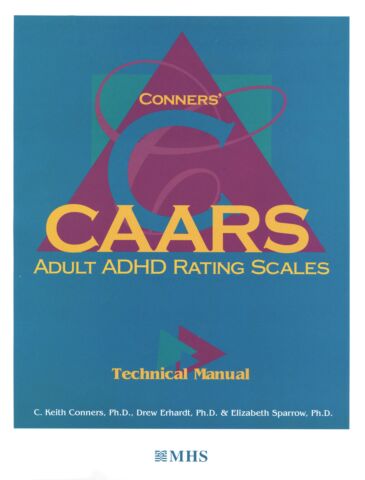
Conners Adult ADHD Rating Scales [CAARS]
A multi-dimensional assessment of adult ADHD. Measures the presence and severity of ADHD symptoms in adults ages 18 and older.
For ages: 18 and older
Administration type: Self, Observer
Administration time: 10 to 15 minutes
Reading Level: 4th grade
Format: Online administration and scoring in MHS Assessment Centre+(MAC+), Hand scored
Authors: C. Keith Conners, Ph.D; Drew Erhardt, Ph.D & Elizabeth Sparrow, Ph.D
CAARS online have been discontinued
Printed Forms & Handscoring Materials
Test forms, response booklets and scoring reference manuals.
Printed Manuals
Physical printed manuals.
CAARS O:L Forms (25) – Observer: Long Version
CAARS O:S Forms (25) – Observer: Short Version
CAARS O:SV Forms (25) – Observer: Screening Version
CAARS S:L Forms (25) – Self: Long Version
CAARS S:S Forms (25) – Self: Short Version
CAARS S:SV Forms (25) – Self: Screening Version
CAARS Manual
When ADHD stays with a person into adulthood, it usually contributes to larger personal and professional difficulties. The Conners’ Adult ADHD Rating Scales (CAARS™) scales measure the presence and severity of ADHD symptoms so that you can determine whether or not ADHD is a contributing factor to a client’s difficulties.
Key Features
- Measures the presence and severity of ADHD symptoms
- Can be used in clinical, research, rehabilitation, and correctional settings
- Offers long, short, or screening versions
- Provides self-report and observer rating forms
The Conner’s Adult ADHD Rating Scales (CAARS) quantitatively measures ADHD symptoms across clinically significant domains while examining the manifestations of ADHD in adults based on scientific literature and the authors’ clinical experience. The CAARS results may help you identify contributing factors to a client’s problem in clinical, research, rehabilitation and correctional settings.
The CAARS elicit self-report and observer ratings to give a multiple-informant assessment. The self-report and observer forms address the same behaviours and contain identical scales, subscales, and indexes. Raw scores and T-scores are produced for each scale, subscale and index.
Normative data for the self-report forms consist of 1,026 nonclinical adults, while the observer forms consist of friends of 943 non-clinical adults. Separate norms are available by gender and age-group intervals (18-29, 30-39, 40-49, 50+ years).
Key areas measured
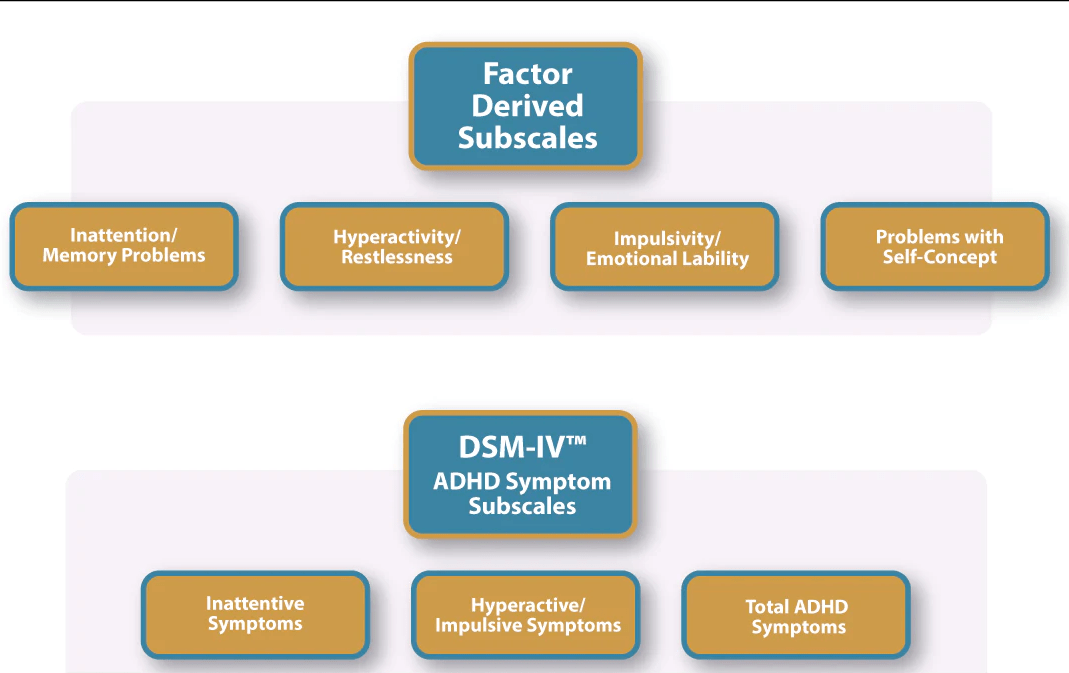
Long Versions
Number of items:
- Self-report 66
- Observer 66
Provide the most detailed information upon which to base treatment plans.
The long self-report and observer forms provide scores for nine empirically derived scales that assess a broad range of problem behaviours. They include three DSM-IV Symptom measures (Inattentive, Hyperactive-Impulsive and Total ADHD Symptoms), a 12-item ADHD Index, and an Inconsistency Index for identifying random or careless responding.
Factor-Derived Subscales
- Inattention/Memory Problems
- Hyperactivity/Restlessness
- Impulsivity/Emotional Liability
- Problems with Self-Concept
DSM-IV ADHD Symptoms Subscales
- Inattentive Symptoms
- Total ADHD Symptoms
- Hyperactive-Impulsive Symptoms
- ADHD Index
- Inconsistency Index
Short Versions
Number of items:
- Self-report 26
- Observer 26
Factor-Derived Subscales
- Inattention/Memory Problems
- Hyperactivity/Restlessness
- Impulsivity/Emotional Liability
- Problems with Self-Concept
- ADHD Index
- Inconsistency Index
Screening Versions
Number of items:
- Self-report 30
- Observer 30
The CAARS screening versions include the same 12-item ADHD Index of the long and short versions, as well as the DSM-IV ADHD Symptom Subscales (18 items that relate to DSM-IV criteria for ADHD). Ideal for quick identification, the screening versions address the following areas:
DSM-IV ADHD Symptoms Subscales:
- Inattentive Symptoms
- Total ADHD Symptoms
- Hyperactive-Impulsive Symptoms
- ADHD Index
two valuable Report options
Profile Reports
Summarize the results of an individual administration, providing scores for all scales. Available for all three versions (long, short and screening) of the Self-report and Observer.
Interpretive Reports
Provide detailed information about scores from a single administration, presented both numerically and graphically. An individual’s scores are compared to those in the normative sample and elevations at the scale and subscale level are indicated. Available only for long and short versions of each assessment.
Sample Reports
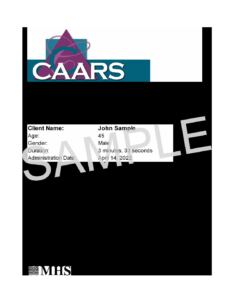 CAARS_Self-Report_InterpretiveReport_Sample
CAARS_Self-Report_InterpretiveReport_Sample![]() Download
Download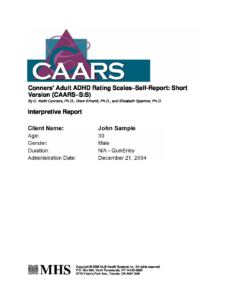 CAARS_Self-Report_InterpretiveReportShort_Sample
CAARS_Self-Report_InterpretiveReportShort_Sample![]() Download
Download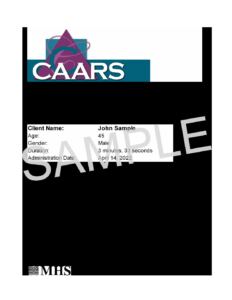 CAARS_Self-Report_ProfileReport_Sample
CAARS_Self-Report_ProfileReport_Sample![]() Download
Download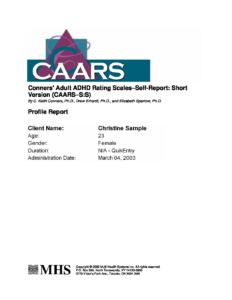 CAARS_Self-Report_ProfileReportShort_Sample
CAARS_Self-Report_ProfileReportShort_Sample![]() Download
Download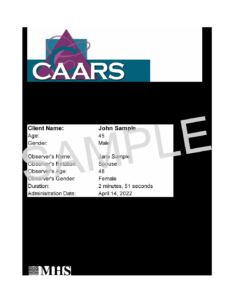 CAARS_Observer_InterpretiveReport_Sample
CAARS_Observer_InterpretiveReport_Sample![]() Download
Download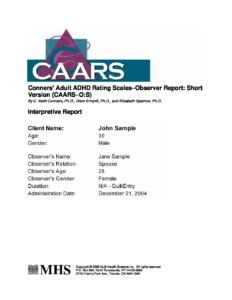 CAARS_Observer_InterpretiveReportShort_Sample
CAARS_Observer_InterpretiveReportShort_Sample![]() Download
Download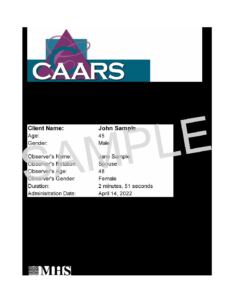 CAARS_Observer_ProfileReport_Sample
CAARS_Observer_ProfileReport_Sample![]() Download
Download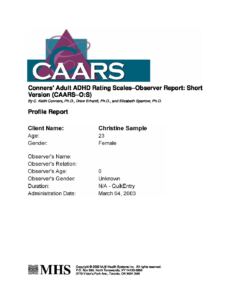 CAARS_Observer_ProfileReportShort_Sample
CAARS_Observer_ProfileReportShort_Sample![]() Download
Download
Online administration in MHS Assessment Center + (MAC+)
Assessing online has never been easier with the new MHS Online Assessment Center +. Experience the new online platform designed with clinicians for clinicians to ensure the easiest, fastest and most accurate assessing possible!
Download full list of assessments available in the MHS Online Assessment Center+
Why use the CAARS online?
- Save time – fast, easy and accurate administration with automated scoring
- Assess and score from anywhere – enjoy the convenience of viewing reports from your home, office or anywhere with an online connection
- Improve efficiency and accuracy – when items are absent, prompts appear to ensure information is not missed
- User friendly – easy to use interface for practitioners and respondents
- Gain information easily – email a link to the form directly to the respondent
- Tailored organisation – data can be customized to how you work
- Benefit from significant cost savings – don’t purchase paper forms in bulk ever again
Quikscore forms are easy to administer and hand score. Profile forms are included where you may quickly plot raw scores for conversion to T-scores. The resulting profile provides the individual’s assessment scores and comparison with the appropriate age and gender normative group. Profile forms are ideal for result presentation and to monitor treatment progress.
Conners’ Adult ADHD Rating Scales (CAARS): For Use in Correctional Settings
The CAARS: For Use in Correctional Settings Supplement (27 pages) is now available. This is a corrections-focused multi-dimensional assessment of adult ADHD. Studies show that ADHD is found in correctional settings at a relatively high rate and that adults with ADHD are at an especially high risk to recidivist. The CAARS help to detect ADHD promptly so you may develop the best rehabilitation and release plan.



